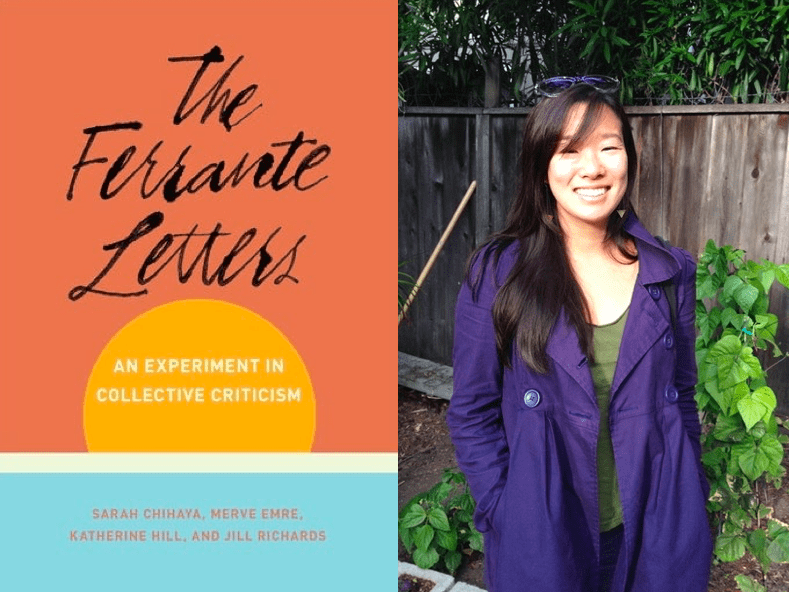Sarah Chihaya is Assistant Professor in the Department of English. “The Ferrante Letters: An Experiment in Collective Criticism” was co-authored by Merve Emre, Katherine Hill, and Jill Richards, and published by Columbia University Press in January 2020. This retrospective Q&A is part of an effort to acknowledge all the wonderful books published early in the pandemic.
How did you get the idea for this project?
After I moved to Princeton, I found myself missing the ongoing, casual critical conversations that characterized my friendships in graduate school. These were discussions in which personal, everyday matters and silly jokes were intertwined with serious critical and theoretical claims, that unfolded gradually over text, in emails, at bars, and in kitchens and backyards. I desperately wanted some way to replicate this—the kind of talk that’s in the background of all scholarly work—and see what it could make possible in writing. At the time, some of my friends were participating in a column called “Dear Television” at The Los Angeles Review of Books, in which a rotating group of correspondents wrote occasional missives on ongoing television series. This format really appealed to me—I love sending letters, maybe a little too much, and I am an incorrigible writer of very long emails. So, I wondered if a long-term epistolary conversation about a single text, carried out online for readers who could also write in and contribute, could demonstrate the unpredictable and often indirect paths writers take to eventually arrive at polished argumentative claims. Part of this experiment would be to emphasize the slowness of thought and creativity. Rather than churning out singular readings of texts, as we so often do in both scholarly and popular criticism, the goal was to reject that emphasis on rapid production and focus instead on deliberation, even on generative repetition. Also, to be perfectly frank, I was feeling burned out after finishing my dissertation, and really wanted a project that would revive my excitement about writing. I invited Merve Emre, Katherine Hill, and Jill Richards to join me in this summer-long letter-writing project, without imagining that it would eventually result in a book—I think we all just wanted to enjoy the chance to think with each other, and really take our time with Ferrante’s novels.
How has your project developed or changed throughout the research and writing process?
When we started writing to each other in the summer of 2015, the project was published online by Contemporaries, a section of the open-access journal Post45. I was the editor of Contemporaries at the time, and thought that this format might work as an ongoing feature—after our summer of Ferrante, I imagined that other groups of correspondents might continue to write on other texts, in other summers. In fact, this feature, “The Slow Burn,” has continued at Contemporaries, with later series on Karl Ove Knausgaard’s My Struggle, David Lynch’s Twin Peaks: The Return, Darren Star’s Sex and the City, and most recently, the Book of Exodus (in cooperation with Jewish Currents).
As I mentioned above, the four of us didn’t begin with any plans to translate the Ferrante Slow Burn into book form. We were lucky enough to be noticed by the editors of the Literature Now series at Columbia University Press, Matthew Hart, Rebecca Walkowitz, and David James. They reached out to us to ask if we would be interested in developing the project further for Columbia, which motivated us to think about how to continue the work we’d done online in the summer in an expanded form. We ended up splitting the book into two parts: the first is made up of correspondence from Contemporaries, and the second half is a series of longform essays, one by each of us, that draws on the ideas we first formulated in our letters to each other. We also published several wonderful guest letters in that original series, which are included in the book, as well.
What questions for future investigation has the project sparked?
For me, and I think for all of us, the process of writing together in both iterations of The Ferrante Letters really made us wonder about the future of collaborative work in the humanities. Earlier feminist collectives of writers and thinkers, like the Milan Women’s Bookstore Collective and the Combahee River Collective, inspired and informed our thinking when we were conceiving of the book together (though obviously our Ferrante project is on a much smaller scale!). Looking ahead, I am curious and excited to see what new forms of communal, collective, and collaborative work emerge in literature and the humanities more broadly—I really believe that these endeavors are the future of our discipline, as literary scholars, students, and teachers.
Why should people read this book?
First of all, if you are a reader of Ferrante, we hope you will find a lot to enjoy in this book! The goal of the project was ultimately to create work that really engages readers and makes them feel like they’re part of an ongoing conversation about the Neapolitan novels. The image we always fall back on when describing the book is “halfway between the book club and the seminar room”—a tone that we hope provokes both argument and pleasure. And I hope that readers who are also writers will feel motivated to start their own collective projects, and that The Ferrante Letters might inspire more creative forms of critical conversation in the years to come.
Learn more about other publications by Princeton University faculty in the Humanities by exploring our Faculty Bookshelf.
















